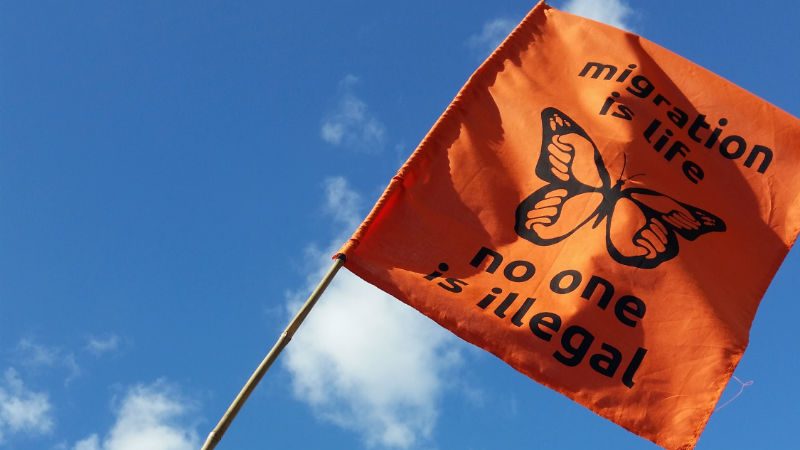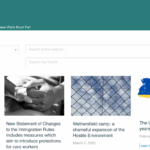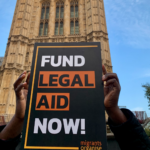On 6 September 2023, Right to Remain held our first session to learn about the Illegal Migration Act (IMA), and explore its potential impact on our communities and allies. We wanted to hold this event for a number of reasons: to ensure grassroots organisations have the correct information and understand how the Act will affect their communities; to reset the narrative around the IMA from “we need to oppose” to “we need to think ahead” now that the Act has been passed, and to understand how groups are preparing their communities, so that at Right to Remain, we can think about how to best work with them.
We were joined virtually by 30 individuals, from grassroots groups, law firms, statutory organisations, and beyond, bringing with them various expertise and strengths to the discussion. To get an idea of people’s initial opinions around the Act, we started the session with a three poll questions:
- Do you feel confident that you know exactly what is going to change as a result of the IMA 2023?
- Do you receive more questions and queries about the asylum and immigration system from people?
- Has your group changed the way you work in response to or in preparation for the IMA 2023?
The answers spoke for themselves; 100% of attendees agreed they don’t feel confident in their knowledge of what will change due to the Act; 42% said queries have increased, while 58% have stayed the same; and 82% of people said they haven’t started planning for changes, but they know they need to. There was an overwhelming feeling of confusion and concern, of both the Act itself, but also the effect it will have on people seeking asylum, and other services that intersect, such as homelessness, trafficking, women’s rights and so on.
Within our tight time constraints, we split the session into two sections. In the first, Legal Education Officer Yumna took participants through the Act, explaining the parts that are already being enforced by law, and the parts that are yet to be enforced, due to the lack of regulations around how they would work in practice. Yumna outlined why the Act is not only scary but also extremely confusing, increasing our sense of anxiety. If you would like to read more on this, Yumna has written a Medium piece looking at the Act in more detail.
The second half of the session was dedicated to assessing the potential impact of the IMA at its differing levels; individual, community/organisational and societal. We first looked at these as a group, what each level meant and the implications. We then broke off into breakout rooms, where, in small groups, we explored the following questions:
- What do you think the impact of the IMA will be? On individual, community/organisation and societal level?
- What are you most worried about?
- What do you think we can do about it?
Possible Impact
A common concern when looking at the levels of impact was capacity. Capacity is already stretched, both in terms of organisations and community groups’ capacity to support and accommodate migrants in the current system, but also to respond to the demands for accurate information about how this Act will affect people. There was also discussion on funding constraints and the future of financial support in the sector.
Another impact considered by the group was appropriate methods of communication – how do we talk to people about the IMA without causing huge fear and anxiety? The need for correct, up to date information and legal literacy is more important now than ever before. Information is empowering, because it clarifies options available to us and prompts us to think about what we need to do in response.
Worries
Turning to the second question, it was unsurprising that there were various worries identified among the group. Burnout was a key theme, as individuals recognised that the Act, despite not holding any substance in practice yet, will work to increase the hostile environment in ways previously unseen, leading to exhaustion and a constant need to stay on top of changes and updates.
The effect of the Act on young people was another cause of unease. We discussed the need to communicate the changes to young people in a way that doesn’t cause fear or anxiety, but also spoke generally on the sheer levels of confusion in trying to plan for the change when there is no practical information available on how it will be implemented. Another issue raised was young people not being able to access services like housing, resulting in homelessness – what support then becomes available?
This has been something we have been concerned about at Right to Remain for a while, and was echoed throughout discussion during the session – destitution, detention, and exploitation. Each of these already horrifying conditions feeds into the next; the harshness of the act will either force people into detention, or underground, where they are more likely to be destitute and easily exploited. As this is currently speculative, it is hard to know where to concentrate efforts, while at the same time community organisations need to come together on this with a unified approach. To make matters worse, the cost of living crisis is already exacerbating these concerns, with people finding it increasingly difficult to pay their rent or food costs. The knock on effect of this is a polarisation of need, creating an us vs them, or a ‘deservedness’ narrative that is dangerous and harmful to people seeking asylum and people who become undocumented.
What are groups doing in response to the IMA?
As we wrapped up the session, the attendees shared their next steps. Many said they would be taking the information back to their colleagues to start a similar conversation, but importantly to their members and communities. The session helped them think about ways to communicate the IMA to their staff and volunteers, with one organisation facilitating safeguarding training with their members to prepare for higher risk of detention.
In light of the increased risks of destitution, one organisation shared that they were hosting a brainstorming session around hosting potential in their area, tapping into those residents who had been forthcoming in hosting Ukrainians last year.
Most importantly, there was indication that the IMA had propelled organisations into action as they have had to respond to very real threats in their communities. One group, who have been focussing on holistic wellbeing projects at their centre, explained how three of their members were arrested and detained overnight. Acting quickly, they mounted a campaign to get them released, and 185 members came together to stand in solidarity with them, using the Right to Remain Toolkit as guidance. Radical action like this is crucial. It was echoed through the comments of another organisation, who said from seeing how the Hostile Environment targets racialised minorities, they have changed from being a passive social support organisation to a more proactive social/racial justice organisation, and are now making links with groups outside of their region in order to provide solidarity and share knowledge and strategies.
From Right to Remain, there are three messages we have for our community, everyone we are working with and beyond:
- We will do this together
The struggle against this Act is something we are all fighting, and we must do so as one to have a chance at standing against it.
- Stay informed and keep informing each other
We do not know how the Act will work in practice, and things are likely to change in the future. It is so important for groups to stay up to date with the latest and most accurate information and ensure this is a channel that allows individuals in and out of the asylum and immigration system to access this information.
- Time to build a bigger tent
The Act is likely to interfere with our community’s ability to survive. We need to expand our community of care, support and radical solidarity by looking outwards and seeking more allies in our local community.
Right to Remain would like to thank everyone who attended the session, and helped each other to think about what’s next.
We are running this session again, in Manchester in person on 4th October, and online on 19th October. Please email esther@righttoremain.org.uk to sign up.















Discussion: